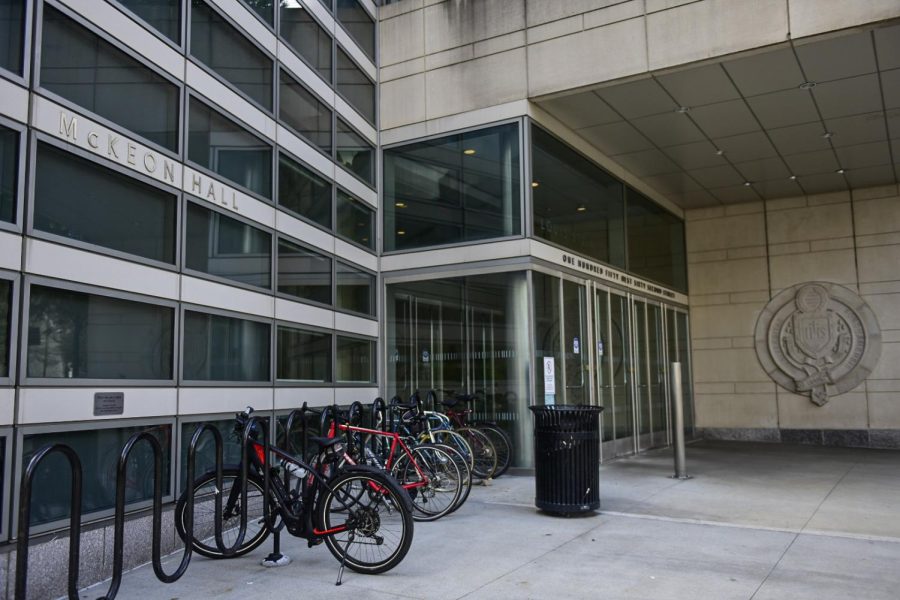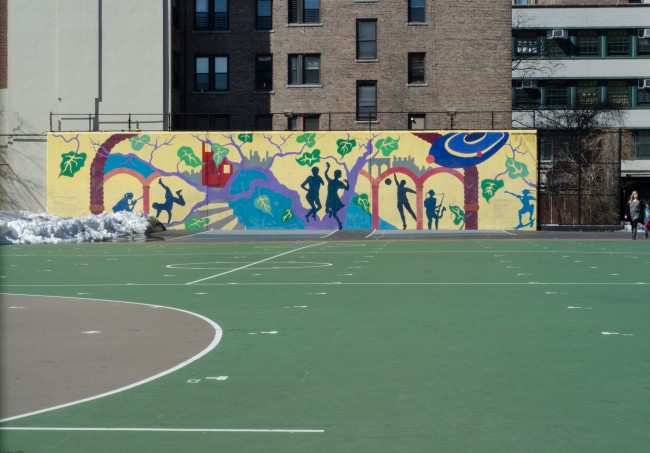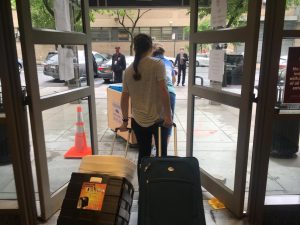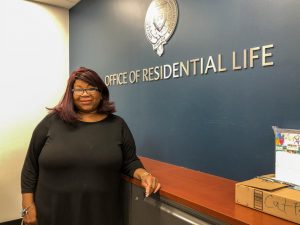Residents Feel Unsupported by ResLife’s Response to Microaggressions
Residents share their experiences of racial discrimination and their disappointment with the university’s recommended resources
An April 2022 email from the McKeon Hall RDs detailed the harm that racial microaggressions may bring to the community and emphasized the importance of tolerance.
September 19, 2022
Content warning: The following article includes mentions of microaggressions and discussions on race-based discrimination and bias-related incidents.
Former Resident Director (RD) Kris Little and current RD Savanah Manos addressed allegations of misidentification motivated by race within the first-year residence hall in an email sent to the McKeon residential community on April 11, 2022. The email encouraged students to be tolerant and create an environment that is accepting.
“It has been brought to our attention that there have been occasions where members of the residential community have misidentified other members of the community based on their race,” the email read. “Regardless of the setting or details surrounding the incidents, we want to bring awareness to how harmful and damaging racial microaggressions and acts of implicit bias are to the residential community.”
According to Former ResLife Director Greg Jones, the misidentification of staff members on the basis of race led to the email’s release.
Jenifer Campbell, dean of students at Lincoln Center, echoed Jones’ response and stated her understanding of the incident was that there were “some mis-identifications of individuals based on race which led to the incidents being addressed in the community.”
The subject line “Understanding the Impact of Microaggressions to Foster an Inclusive Residential Community,” and the email’s contents highlighted the communication recovery model which outlines steps for accepting, apologizing and adjusting one’s own behavior, the McKeon RDs noted at the time.
The email sparked conversations among some first-year residents on the handling of race-based complaints on behalf of the Office of Residential Life (ResLife) and other administrative figureheads at Fordham Lincoln Center.
Former First-Year Students Speak On Experiences in McKeon Hall
Three former McKeon residents of color shared their encounters with race-based microaggressions in the residence hall and at Fordham. Two of the students that were interviewed requested to remain anonymous due to fear of retaliation.
“My experience living in McKeon the first semester was really rough” anonymous student
“My experience living in McKeon the first semester was really rough,” one anonymous student, Fordham College at Lincoln Center (FCLC) ’25, said.
The student, who now lives in McMahon Hall, lived in a three-person room in McKeon Hall throughout the 2021-22 academic school year and spoke about the treatment they received from one of their roommates as a person of color in comparison to their other roommate who was white.
The student noted that their third roommate would only acknowledge their white roommate and they “just couldn’t understand why.”
“(They) would only talk and would only communicate with me if it was to blame me for something,” the student said.
“I am confident staff did not ‘sweep’ the individual’s concerns under the rug. As with any report, situations can be complicated and multi-faceted” Jenifer Campbell, dean of students
To determine whether the situation was racially motivated or based on a lack of communication, the resident involved ResLife. They noted that ResLife encouraged several mediations as a form of resolution but they felt that during the mediations, their concerns were “brushed under the rug.”
“It felt like the whole thing turned into me being the villain for even bringing up this idea, and I ended up feeling really bad about it because everyone was like, ‘Oh, it was just a misunderstanding,’ but it didn’t feel like a misunderstanding on my part,” they said.
In response to this, Jenifer Campbell, dean of students, said that such situations can be complex and multi-faceted, and that staff strive to thoroughly address reports.
“I am confident staff did not ‘sweep’ the individual’s concerns under the rug. As with any report, situations can be complicated and multi-faceted,” she said. “I can assure you, every report is taken seriously.”
Campbell added that when there is a conflict, there are two sides to every story and that it’s crucial to listen to both sides.
“Interpretations can be different, and we are responsible for determining what happened between the two parties,” she said.
The resident spoke to members of ResLife’s staff about their experience with race-based microaggressions and racism on Fordham’s campus and felt that their Resident First-Year Mentor (RFM) was “incredibly helpful.” They appreciated that their RFM provided them with the space to talk to someone their age and mentioned that they felt more comfortable approaching their Resident Assistant (RA) and their RFM than ResLife.
The anonymous resident added that they do not believe that ResLife is a reliable resource and shared that, when confronting another experience with microaggressions, they felt that they and their friends could not seek ResLife as a resource due to how their previous conflict was handled.
“It’s just deterred a lot of us from actually seeking out proper help and resources that we need, especially in situations where we do feel like we’ve been violated or traumatized or lied to,” they said.
In response to this, Campbell noted that RAs are a part of ResLife and that they are trained by professional staff in terms of mitigating situations.
In response to this, Campbell noted that RAs are a part of ResLife and that they are trained by professional staff in terms of mitigating situations.
“Without question, RAs are ResLife,” she said. “Those same individuals are trained by ReaLife. You can’t separate the two.”
Ara Tandon, FCLC ’24 and a former resident of both McKeon and McMahon Hall, also spoke about their experience as a student of color with ResLife and their feelings surrounding their presence in predominantly white spaces. Tandon mentioned that they appreciated having an RA in McKeon who is a person of color and said it allowed them to feel recognized and validated, which added a sense of comfort to the RA-resident relationship.
“I never really felt like I had to go sit down and have tough conversations with (them), but part of that comfort was because I didn’t have to explain a lot of these things,” they said.
Another anonymous former McKeon resident and current resident in McMahon, FCLC ’25, shared an experience in which a friend imposed racially-motivated microaggressions on them and their friends in the residence hall. They explained that in attempting to confront the individual who had marginalized them, they felt burdened with maintaining composure at risk of seeming hysterical.
“When a white person gets angry it’s like, ‘Give them some room.’ It’s validated for them but invalidated for me” anonymous student
“We always have to be the ones to move on, we are always immature, we get angry, we are overreacting,” they said. “But when a white person gets angry it’s like, ‘Give them some room.’ It’s validated for them but invalidated for me.”
The second student said they felt supported by their circle of friends but noted that they felt approaching their RA would be unhelpful as it would not entirely resolve the issue. The resident expressed that they felt a mediation would not be helpful.
“I understand the process but don’t think I trust the process enough,” they said.
The second student chose not to report the alleged incident to their RFM, RA or RD at risk of not being believed.
“I just know there are instances where the white voice is believed over the POC (people of color) voice,” they said. “We know who gets the upper hand, we know who gets heard more, we’re gonna get painted like the angry, crazy POCs.”
ResLife Discusses the Process of Reporting Bias-Related Incidents
Investigations into bias-related incidents are usually conducted by Public Safety. Depending on the individuals involved in the case, other departments may be brought in to contribute to the report.
Robert Dineen, assistant vice president for Public Safety, outlined the process of how a student can file a race-based discrimination complaint with the Department of Public Safety (DPS). He noted that, when a student files a complaint, DPS conducts “fair and impartial investigations with the objective of gathering an accurate description of the facts from both parties.”
Public Safety may be required to interview the student and conduct an investigation alongside the dean of students in order to meet legal requirements and protect the student’s safety, according to Dineen.
“When a student comes to file a race based discrimination complaint with the Department of Public Safety (DPS) our response will be handled sensitively and discreetly to protect the student’s privacy and preferences,” he said.
Depending on the severity in nature of the race-based misconduct, a report of the investigation is forwarded to the dean of students if it involves a student-on-student case and will align itself with the university’s code of conduct process. If the misconduct involves an employee, the Office of Human Resources will be brought in to participate in that respective investigation.
Dineen noted that individuals may also seek out other legal remedies, including criminal prosecutions, as DPS maintains a cooperative relationship with the NYPD and will assist victims through each step of the process: reporting, investing and resolution. He added that DPS can connect students with other offices at the university including ResLife, OMA, the chief diversity officer, CPS and Campus Ministry.
To file a complaint within a residence hall, Jones said a student should speak to their RA or RFM, and the information will be relayed to the RD.
From there, depending on the nature of the complaint and if the student seeks further assistance, the RD will discuss ways to help with the student. Campbell added that if the complaint moves forward, Public Safety will then begin an investigation of the involved parties.
Former Residential Assistant Highlights Staff Experience
In regard to handling a race-based complaint, Royall McMahon-Ward, FCLC ’22 and a former RA in McMahon Hall during the 2021-22 academic school year, explained that RAs are instructed to gauge the situation and its severity. She emphasized that RAs are tasked with ensuring that the resident who allegedly has been transgressed against is safe.
According to McMahon-Ward, upon learning about the situation, they first conclude whether the space the resident is in is safe. If the resident does not feel safe, the RA will contact the RD and the resident will be placed in emergency housing. If the resident does feel safe, the complaint will still be reported to the RD.
McMahon-Ward noted that, given the influx of residents in the years since the pandemic, if the halls are overbooked, she does not know where the students who need emergency housing would be placed.
“I genuinely don’t really know what would happen because if there’s not space, it becomes a little tricky,” she said.
The only formal training on handling race-based complaints is a diversity, equity and inclusion training which is held over a two day period.
She also mentioned that once the complaint is filed to the RD, RAs are not always aware of the next steps taken.
“I’ll be honest, RAs don’t really know what happens after because it’s kind of like once it’s given to the resident directors we are no longer allowed to be informed as to what’s going on because of confidentiality,” McMahon-Ward said.
Overall, McMahon-Ward stressed that residents often have to state their case and RAs need to support their residents in these claims. In terms of the email released to the McKeon community, McMahon-Ward expressed that she was unaware of the email as it was not mentioned during staff meetings and had only heard about it from word of mouth.
In her experience in McMahon, McMahon-Ward said that there had never been any incident regarding race to warrant a widespread email. She added that RAs in McMahon receive the same training as RAs in McKeon Hall.
The only formal training on handling race-based complaints is a diversity, equity and inclusion training which is held over a two day period. The training is led by other RAs and includes a debriefing on all of the policies and responses to different scenarios and a roleplay activity in which resident assistants act as residents and then respond to these situations accordingly, according to McMahon-Ward.
According to Campbell, RAs and RFMs are trained to identify and recognize situations that involve bias and are instructed to contact an RD for further guidance and assistance.
“It’s a very traumatizing day and probably shouldn’t happen the way that it does happen,” she said.
According to Campbell, RAs and RFMs are trained to identify and recognize situations that involve bias and are instructed to contact an RD for further guidance and assistance. She added that professional and paraprofessional ResLife staff are put through annual training modules and work directly with OMA to discuss bias-related incidents.
She noted that the method of training is to “train the trainer” and the purpose is for previous RAs to share their experiences regarding diversity, equity and inclusion as well as emergency response and add some level of opinion and advice that is relevant to their experience.
“Part of training is returners are asked to be in lead roles,” Campbell said.
Campbell also added that she believes there is nothing abnormal about the process and mentioned that in terms of ResLife’s development and training modules, the department makes an effort to make students aware of living in a diverse environment and be conscious in the ways they conduct themselves.
“Resident assistants of color end up teaching those, and they have complained that it’s not fair for them to have not only have the burden of experiencing them the most but also then having to educate everyone else” Royall McMahon-Ward, FCLC ’22
McMahon-Ward described the training as “the blind leading the blind,” with RAs of color having to inform white RAs about their experience.
“Resident assistants of color end up teaching those, and they have complained that it’s not fair for them to have not only have the burden of experiencing them the most but also then having to educate everyone else,” she said.
Ultimately, McMahon-Ward said that members of staff have voiced complaints about the training but have received no changes from administration.
Reactions to ResLife’s Email
The first anonymous student shared that when they first saw the email sent by the McKeon RDs, they scoffed at it.
“An email isn’t doing a lot,” they said. “An email is just an email. Most people don’t read their emails or a lot of emails from ResLife usually get brushed off by people so it’s not really like they’re doing a lot to help microaggressions. It really does seem like they do the surface level and then don’t really help when you actually need help.”
Campbell noted that she was not involved in the process of sending out the email but believed the email was sent from an informational perspective. She added that students had an opportunity to meet with the McKeon RDs if they had further concerns and that that option was made known to them.
The email cited Campus Ministry, Office of Multicultural Affairs (OMA), Counseling and Psychological Services (CPS) and Public Safety as resources for students. The second anonymous student commented that they are yet to witness offices on campus provide a source of support.
“I’ve never seen an outcome where they (ResLife) have done something efficiently because an email sending out links to people that can support you is not helpful” anonymous student
“I’ve never seen an outcome where they (ResLife) have done something efficiently because an email sending out links to people that can support you is not helpful,” they said. “And an email with resources is not sufficient. And our students, our POC students, deserve more than that.”
The first anonymous student noted that they do not believe the university provides helpful resources and is unaware of what to do when faced with a situation in which they have to confront microaggressions. “I feel like Fordham has to do a better job of making it more known because, at least at orientation this year (2021), they made the fact that they are committed to diversity and inclusion known, but they never gave resources for race complaints,” they said.
They added that they felt the university advertises these resources as clubs rather than actual resources, referring to Campus Ministry and OMA, and noted that Fordham should make a better effort at advertising them and making them feel more welcoming because they were not aware they could utilize them for help.
“I want to feel safe in my home” anonymous student
The second anonymous resident suggested affinity groups on campus organizing seminars on white privilege, which promote allyship toward BIPOC students and encourage white students to practice accountability with their white friends. They emphasized that these reforms should elevate POC voices and support these students without silencing fellow people of color.
“I want to feel safe in my home,” they said. “I don’t want to have to worry, or feel like I don’t belong here.”


















